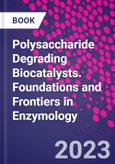Polysaccharide-Degrading Biocatalysts provides a thorough grounding in these biocatalytic processes and their growing role in the depolymerization of polysaccharides, empowering researchers to discover and develop new enzyme-based approaches across pharmaceuticals, fuels, and food engineering. Here, over a dozen leading experts offer a close examination of structural polysaccharides, genetic modification of polysaccharides, polysaccharide degradation routes, pretreatments for enzymatic hydrolysis, hemicellulose-degrading enzymes, biomass valorization processes, oligosaccharide production, and enzyme immobilization for the hydrolysis of polysaccharides, among other topics and related research protocols. A final chapter considers perspectives and challenges in an evolving, carbohydrate-based economy.
Please Note: This is an On Demand product, delivery may take up to 11 working days after payment has been received.
Table of Contents
1. Plant cell wall polysaccharides: Methodologies for compositional, structural, and physicochemical characterization
2. Genetic modification of plants to increase the saccharification of lignocellulose
3. The diversity of plant carbohydrate hydrolysis in nature and technology
4. State-of-the-art experimental and computational approaches to investigate structure, substrate recognition, and catalytic mechanism of enzymes
5. Pretreatments as a key for enzymatic hydrolysis of lignocellulosic biomass
6. Importance of accessory enzymes in hemicellulose degradation
7. How ligninolytic enzymes can help in the degradation of biomass polysaccharides, cleavage, and catalytic mechanisms?
8. Biochemical and biotechnological aspects of microbial amylases
9. Hydrolysis of complex pectin structures: Biocatalysis and bioproducts
10. Macroalgal polysaccharides: Biocatalysts in biofuel/bioenergy production
11. Mathematical modeling of the enzymatic hydrolysis of polysaccharides: A primer
12. Polysaccharide deconstruction products: Production of bio-based building blocks
13. Polysaccharide degradation for oligosaccharide production with nutraceutical potential for the food industry
14. Carbohydrate-active enzymes in the production of lactose-derived tagatose
15. Immobilized biocatalysts for hydrolysis of polysaccharides
16. Carbohydrate-based economy: Perspectives and challenges








